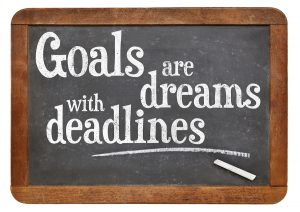It’s the NEW YEAR! Don’t let this year’s resolutions be empty promises to yourself. This year take your career to the next level.
Even though the year has begun, it’s certainly not too late to make workplace resolutions. The most important part in setting these resolutions is keeping them. But if you’re like most people, that probably means seeing those resolutions fly out the window before Valentine’s Day. Let’s do something different and see them through.

To have a better chance of achieving your resolutions, here are a few tips:
Plan to stay on track- Schedule your goals or resolutions. For example, if you want to get a better job this year, figure out what you need to do. Your first step might be to update your resume. Write down what you need to do and when you need to do it. Add these tasks to your calendar. Do this for all your resolutions or goals.
Get an accountability partner- Find someone that you can be accountable to. It helps me to have family or friends to join together to have an accountability goals group. The important thing is doing what you said you’d do and if not, you pay up. You can setup a Venmo account or some other payment system to exchange money for not accomplishing goals.
This year, look at your career and set some goals you can track and achieve. Here are 18 workplace goals for the New Year that will make it your best work year ever.
- Take care of your body
It’s popular to say you want to lose weight for the New Year. How about having a few healthy habits that you can do at work? For example, take the stairs, walk during your breaks, bring a healthy lunch and snacks, or set your printer a little farther than the closest to your desk. Get a fitness tracking device and see how many more steps you can take just by adding more steps to the printer.
I’ve been caught by my co-workers doing lungs or swats. I also walk the stairs while I’m waiting for food to warm in the microwave. Every little bit counts.
- Learn something new
Taking your skills to the next level can position you for a promotion or a pay increase. However, I wouldn’t recommend just doing it for the chance at financial gains. Learning new things can be exciting and increase your self-esteem, this is priceless. No matter what field you are in, there are hundreds of new skills you can learn that could benefit your career.
- Read a book
Reading something career related or motivational can rejuvenate and give you ideas on how to improve the way you work or give you a new perspective. Reading does wonders for your brain. No matter your job or industry, there are books out there that can improve your performance, your outlook, or your personal habits. Even if you think you already know what you need to know, reading a great book on professional development can give you tools to get the edge in the workplace.
- Dust off your resume
Updating your resume is always a great idea. Even if you are happy with your current job. Get prepared for new opportunities. What’s the harm?
As you review your resume, ask the following questions: Is the style current? Is the information up to date? Have I added all my most recent classes/skills/certifications?
- Network monthly
Make a goal to build new professional connections every month. There’s no downside to increasing the size of your professional network. You probably meet people all the time, but do you take the time to listen, grab their business card, and connect with them? Connect with these new friends on LinkedIn so that you can keep up with them.
- Update your LinkedIn profile
Speaking of LinkedIn, is your profile up to date? In the professional world, LinkedIn is crucial to your overall personal brand. Just like your resume, you need to keep the information, tone, and look of it reverent.
- Make a new friend at work
Making new friends can be very beneficial depending on the person you decide to befriend. Look for someone that has a great attitude and that can help you be better in some way. It’s great to have people that can challenge you to be a better you.
- Clean up your work space
This New Year’s resolution idea can double as one for home too! Many of us have hundreds of emails in our inbox, file cabinets or desk drawers that are filled with old papers, or just cluttered work spaces. It doesn’t take long to start organizing and cleaning out irrelevant information. Weed through those files, recycle what you don’t need, and organize the rest. This goes for your computer files, too. You will feel so accomplished.
- Follow a blog
We live in a world with free information, insider tips, and great motivational writers online. Find a blog that you enjoy, whether it’s specific to your industry or just someone who puts a little pep in your step, and sign up to follow it. Don’t know where to find one? Subscribe to Building Connections. This blog often has links to other great blog sites as well.

- Get a mentor
This is my favorite. I have had some really great mentors. The right mentor can be a powerful tool to propel your career forward. Is there a person at your company who you highly respect? Don’t just look up to them. Ask if he or she is willing to be your work mentor. It works best if it is a recognized relationship between the two of you. Set workplace goals together for the New Year and have a little fun while you’re at it. In addition to one-on-one meetings, go for coffee or a walk. You can also join a networking group together. There are many ways to connect with your mentor in a way that will be mutually enjoyable, rewarding, and fun.
- Get a new headshot
A new year could mean a new professional photo for your social media profiles. Depending on your career goals and the type of company culture, your profile photo may be casual or professional in its nature. The key is to select a photo that is high quality — at least 400 x 400 pixels, no larger than 8MB in file size, and does not exceed 20,000 pixels in height or width. Most importantly, you want a picture that truly represents who you are both personally and professionally. A lot of organizations have profile pictures linked to email. Instead of not adding a photo or using some random graphic of a flower, pet, or the sunset. Add a professional picture.
- Give thank you notes
Appreciate people with a handwritten thank you note. By doing this it will make you standout, and it feels good too. All you have do is buy a box of thank-you notes. Then, each month or when you feel inspired, think of someone who did something nice for you. This will help build your connections at work.
- Join a professional organization
This is a terrific way to make connections with people that you may not otherwise meet. This resolution does require a financial commitment, however the benefits you can receive from the connections you’ll make and what you can learn is often well worth the cost. There are tons of professional organizations. You can explore gender specific organizations, race and ethnicity clubs, industry specific, or hobby specific. Another way to search for an organization is to look for one that is focused on your favorite part of your job and check out any conferences they hold. A good conference can help you expand your network significantly and boost your work energy for weeks. Not sure how to find a professional association that’s right for you? Start by finding out which groups your colleagues and managers are active in. You can also check out resources like Meetup.com, 10times, and the Directory of Associations for more options.
- Balance your life
In order to be your best, you have to have balance with work and your personal life. Contrary to what you might see in your leadership chain, it is healthy to have work-life balance. We all hear about work-life balance, but how to you master it? You can master it by working at it. You might not be able to do everything you want in one day or accomplish all of your resolutions in one year, but the key is working at it and being flexible. Therefore, you might miss out on some things, but make sure you make a conscience decision to choose the events or things that you do strategically. Meaning, if you have children, try your very best to be there for their big things in life. Take vacations, and when you go, be present. Don’t take your work with you unless it is absolutely necessary. Try very hard to delegate your responsibilities when you are away or get all your big tasks done prior to leaving.
- Volunteer
Volunteering your time is a great thing to do. If you don’t have time, you can be creative and make time. Look for ways to volunteer at work. A lot of organizations have projects that help other people. You can volunteer to do a can food drive or coat drive. You can become a mentor to someone at work. Volunteering is a great way to positively affect the world, and it’s also another way you can feel good about yourself.
- Get one new professional certification
Take a look at your resume and imagine that you are adding a new certification. Figure out what certification you’d like on your resume and get moving to earn it.
- Give more compliments
Believe it or not, both men and women like receiving compliments. When you are at work, stick to compliments about work. You can be safe by complimenting haircuts or styles. Don’t get weird because this can really blowup on you if you get too personal or start to cross the line.
- Develop better public speaking skills
Join Toastmasters. Work on your presentation and leadership skills. Joining Toastmasters is one of the best ways to reach several of these resolutions. You will be joining a professional organization, learning new skills, developing existing skills, networking, making friends, volunteering and serving in an organization, learning to give evaluations (compliments and helpful feedback), and you can work to earn a professional speaking or leadership certification. All of this for a very little financial and time investment.
Now that you’ve made your New Year’s work resolutions, it’s time get moving on your excellent year.













